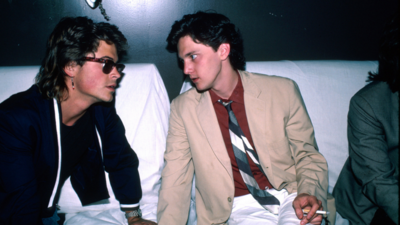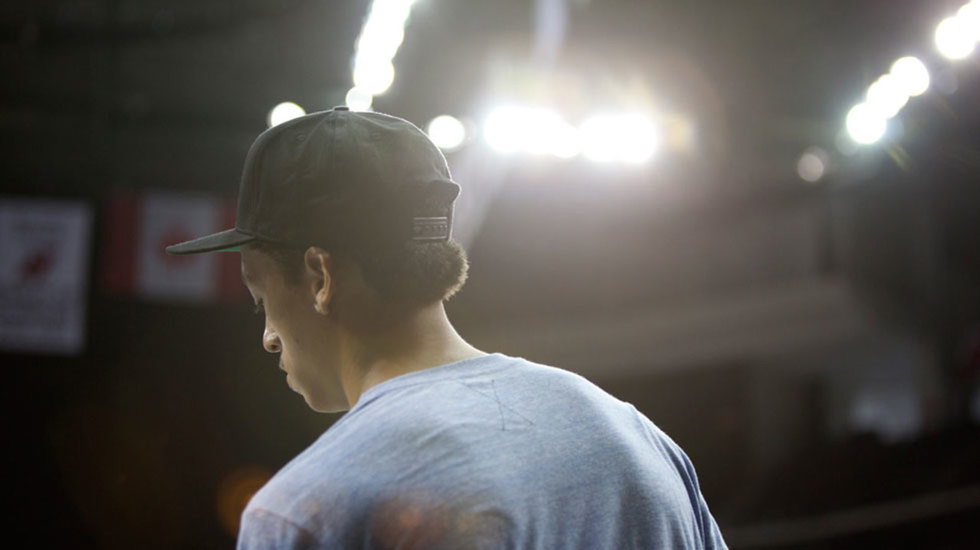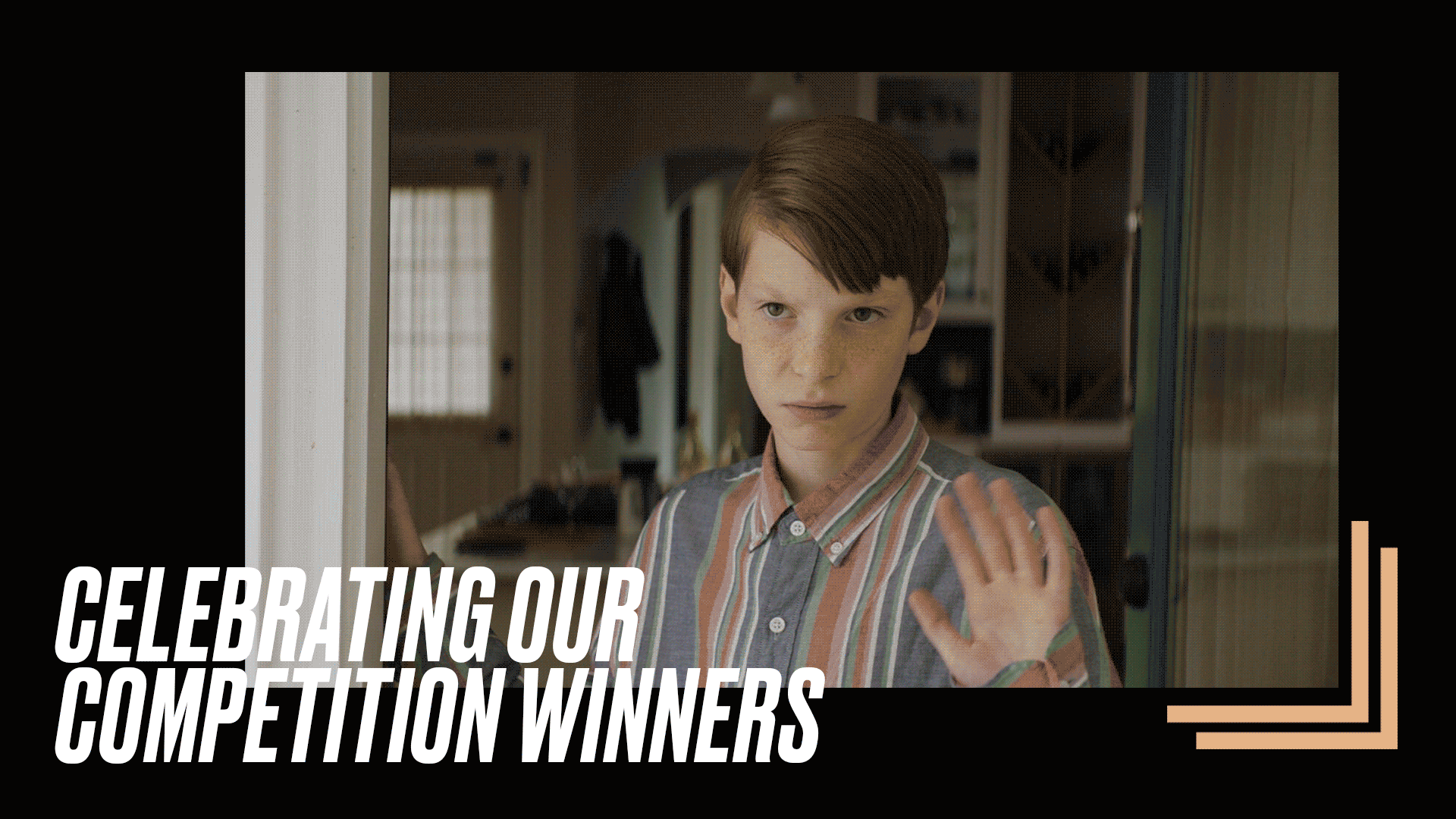
BY KAREN KEMMERLE |
‘The Motivation’ Director Adam Bhala Lough On the Art of Street Skating
Adam Lough is bringing street skating into the mainstream. His documentary, ‘The Motivation,’ follows the world’s top skaters as they prepare for the 2012 Street League Championship. Even if you already know the outcome of the competition, we guarantee you’ll be on the edge of your seat.

Tribeca: Tell us a little about The Motivation. When did you first become interested in street skating?
Adam Bhala Lough: Last summer, I stumbled upon this competition that involved some of the world’s best skaters jumping down something like 10 stairs and grinding. The course seemed like it had been completely built out in a basketball arena. I’d never seen anything like that. I’ve seen a lot of competitions that were free-for-alls, but this one had judges, and it was still really crazy.
I immediately got into it and started doing research on the guys involved, and I realized that there was definitely a movie here. I knew street skating would be something that people would find fascinating both in terms of the athletes and the sport itself. By starting Street League, Rob Drydek allowed skaters who had only been on the fringe the opportunity to be seen by major sponsors and get endorsement deals. The leading competitors in Street League vie for over a million dollars in prize money over the course of a year. Also, they are larger than life characters—just like Michael Jordan, Dwayne Wade, and Lebron James.
I thought that what Rob and all these skaters had done was so brilliant that I reached out to my old friend Steve Berra, who runs The Berrics, because I knew I had to do a movie about this. That’s how it all began. As the film reveals, all of the featured skaters are capable of being the champion.
I think maybe in 12 years, you’ll see skateboarding at the Olympics.
Tribeca: The Motivation follows the lives of some the world’s most famous street skaters like Paul Rodriguez, Ryan Sheckler, Nyjah Huston, Sean Malto, Chris Cole, and Bastien. How did you approach them about being a part of the documentary? Were you surprised at their candidness?
AL: I approached them through Steve and The Berrics. Our producer Tim Dowlin actually approached all the skaters and told them that we wanted to follow them on their road to the championship. Right away, six of the eight said yes. It was tricky getting the last couple of guys to come on board. The biggest challenge was getting great stuff that all eight guys approved, but we pulled it off.
Tribeca: Were you surprised that these guys have had incredibly full lives at 17, 18 and that they were really willing to talk openly about their experiences?
AL: I wasn’t surprised. It is a testament to these guys and to skateboarders that they are comfortable in front of cameras. If you know anything about skateboarding, skateboarders become who they are through the lens of a camera. From the very first moment they start skating, they’re being filmed and trying to get themselves seen. That’s very unique, so they were all extremely comfortable around cameras. I’ve also done a lot of documentaries; I’ve worked with a lot of people who proved to very difficult like Lil’ Wayne and Marilyn Manson. So I know how to talk to people and educate people.
Tribeca: Rob Dyrdek’s enthusiasm and passion for the sport is just infectious. What role does he play in the mentoring of these young skaters since he created Street League?
AL: Rob Dyrdek is the Vince McMahon of Street League. He’s been called Willy Wonka. He’s the guy who makes all these guys’ dreams come true. I think that’s the best way to describe who Rob is and what his influence is on street league and all these skaters’ lives. He is infectious. What he’s done for skateboarding is absolutely phenomenal.
Tribeca: In the end credits, it said his next big goal was to make skating an Olympic sport. Do you think that’s possible?
AL: Not only do I think it’s possible, I think it’s inevitable. I think maybe in 12 years, you’ll see skateboarding at the Olympics. They’ve already got snowboarding along with at least a dozen sports that are total mysteries. Most people don’t know what curling is. Skateboarding is a multi-billion dollar industry. It is among the top three biggest sports for boys and is the second most popular sport in Brazil after soccer.
Tribeca: Street skating plays a powerful role in these men’s lives. In many instances, skating helped them overcome troubled childhoods, absent parents and the demands of fatherhood. Were you surprised at the therapeutic aspects of the sport?
AL: I think that any sport has therapeutic aspects. I run and I play basketball, that’s therapeutic to me. Anyone who does a serious sport, does it partly for that reason. Sports have a therapeutic quality no matter what.

Tribeca: These skaters are dealing with an insane amount of pressure. Which is worst: the pressure the sponsors put on them or the pressure they put on themselves?
AL: I think that varies case by case, but for sure all these guys who are sponsored are getting pressured by their sponsors to be the best. If they’re not the best, they will get dropped and the checks will stop coming. They’re also putting pressure on themselves because they want to be the best, and it’s even harder when you have been at that point and you’re trying to get back there.
Tribeca: Did any of the skaters’ backstories that surprised you?
AL: Bastian’s story surprised me the most. He was the guy I knew the least about at the start of the project. He was an older guy and his story has been shrouded in mystery. I just knew vague details: I knew that he was French; I knew that he had to compete in a European tournament just to get into this street league. He really had to fight his way in.
I didn’t know that he had been this highly influential skater years before who had just disappeared and went and had a family. He had two kids and was just raising a family. He’d all but retired from skateboarding when he heard about this tournament. He showed up to the qualifier, just sort of on a whim, killed it and won.
So I think that’s what surprised me. I knew about some of the other skaters too. I knew about Ryan and his past. I knew a lot about Paul and Chris. I think the other thing that surprised me that didn’t make it into the movie was that Sean Malto was an Army brat. His dad was an admiral or something, so he was moved around a lot as a kid. I don’t think anyone really knows that.
Tribeca: One of the most amazing feats of cinematography occurs when Luan Olivera performs 9 tricks in a row with the camera following him around the skate park in one fluid shot. What challenges does shooting a documentary like this present for the camera operators?
AL: Well, one of the things I learned from making this film is that the guys who film skateboarding are amazing. It’s really difficult to film skateboarding, and we take it for granted when watching skate videos. When you’re out there trying to do it, especially if you’re a novice, it’s really challenging.
Some of those guys that you see in the documentary are some of the world’s best filmers. We were lucky to have them.
Tribeca: I really loved how you utilized classical music at the beginning to elevate the stunts. It makes the audience realize, right off the bat, that street skating is an art. What was the thought process behind that choice?
AL: That was a conscious choice to use a classical music like Chopin, Debussey, Ravel, and Rachmananov. I t might have been because I was listening to a lot of classical music at the time that I was editing the film. That happened in the past with some of my other sport films. Whatever I’m listening to at the time, I’ll play it into the movie. Plus, slow motion and classical music just go well together no matter what.
However, I knew I did not what to use any orchestral stuff, just piano. There’s no grand orchestra or anything like that because that stuff felt really cheesy. I wanted really minimal pieces, and it just really worked. The whole effect was beautiful.
Rob Dyrdek is the Vince McMahon of Street League.
Tribeca: The climax of the film takes place at the 2012 Street League Championships in New York. I had to stop myself from looking up the results because it was so intense. You don’t want any of these men to lose! Can you talk about creating suspense in the editing process?
AL: That was the hardest part of the film to cut. In a nutshell, what we did was decide to present the competition through the eyes of the skaters—their experience and their journey—rather than through an objective video mash-up of the ESPN broadcast. That would have been the lazy and boring way to go about it. This was a competition that had already happened; you can go and find out who won. All the skate community already knows who won. By presenting the competition through the eyes of the skaters, we provided something that nobody had experienced or seen before. I guarantee you that even if you know who won the championship, you’ll still be on the edge of your seat, as you say.
Tribeca: Nyjah Huston is holding a contest in honor of The Motivation premiere. Could you tell our audience a little more about it?
AL: Sure. It’s a contest about showing the world your motivation for being a champion. The first step is that you have to be following him on Twitter and Instagram. The second step is that you have to upload your photos or videos representing the things that motivate you on Instagram and Twitter, using the hashtag #THEMOTIVATION. If Nyjah thinks what you send in is good, he’ll retweet and share with his followers. Whoever gets the most retweets, wins some gear from Nyjah and his sponsors.
Tribeca: What are you most looking forward to at Tribeca?
AL: I’m most looking forward to being there for the first film I have had at Tribeca in 10 years; I was there in 2003. It’s kind of a return for me.
Tribeca: What makes The Motivation a Tribeca must-see?
AL: You’ve never seen skateboarding presented like this before. Plus, Sean Malto, Nyjah Huston and Chris Cole will be there.
The Motivation premieres Thursday, April 25, at the SVA Theatre. For more information and additional showtimes, please visit our Film Guide listing.

